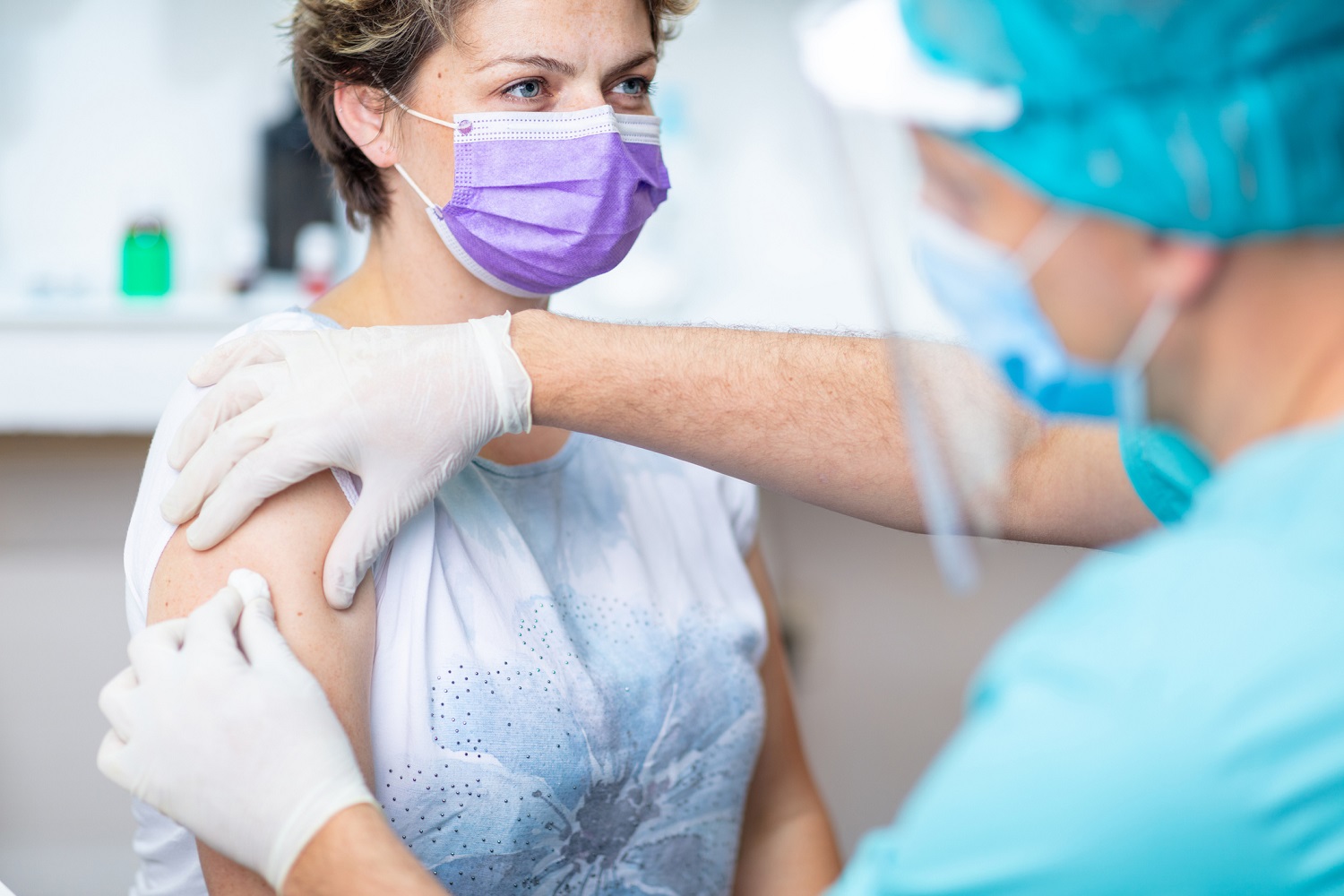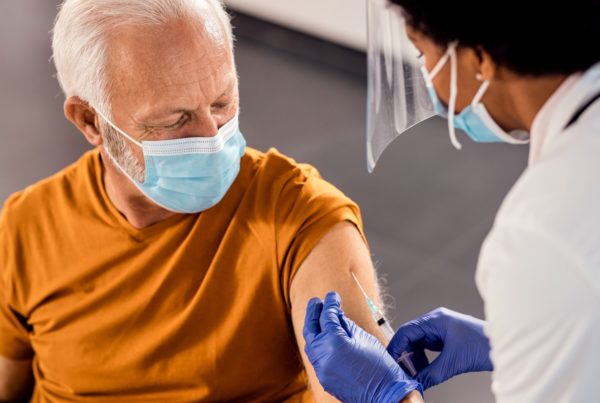
With the first doses being administered across the country, the Pfizer-BioNTech Comirnaty COVID-19 vaccine and the Moderna Spikevax COVID-19 vaccine (mRNA-1273) raised many questions here in Canada and around the world. The two mRNA vaccines were the first COVID-19 vaccines approved by Health Canada in December 2020.
Health Canada has authorized three additional vaccines in February and March 2021:
- the COVID-19 vaccine manufactured by AstraZeneca (AstraZeneca Vaxzevria COVID‐19 Vaccine),
- the Serum Institute of India’s version of the AstraZeneca vaccine (Covishield Vaccine);
- the Janssen COVID-19 vaccine (Ad26.COV2.S) developed by the Janssen Pharmaceutical Companies of Johnson & Johnson.
The AstraZeneca vaccines were developed in partnership with Oxford University.
COVID-19 vaccines are used to prevent COVID-19 which is caused by the severe acute respiratory syndrome coronavirus 2 (SARS-CoV-2).
Even though these COVID-19 vaccines are available, many questions remain unanswered about them. The two most important unanswered questions are:
- How long does immunity last with COVID-19 vaccines?
- Do the vaccines prevent the spread of coronavirus?
With time and further research on vaccinated individuals, we will have the answers to these two key questions.
Despite the growing number of people being vaccinated, it is very important to continue to follow public health guidelines and COVID-19 precautions: wearing masks, practicing proper hand hygiene, physical distancing, and avoiding gatherings. We will need to continue with these key measures until enough of the population has become immune, so that the virus can no longer spread effectively.
Here are answers to some of the most common questions about these vaccines.
- What are the ingredients in the COVID-19 vaccine?
- Pfizer-BioNTech Comirnaty COVID-19:
Medicinal ingredient: mRNA
Non-medicinal ingredients: ALC-0315 = ((4-hydroxybutyl)azanediyl)bis(hexane-6,1-diyl)bis(2-hexyldecanoate), ALC-0159 = 2-[(polyethylene glycol)-2000]-N,N ditetradecylacetamide, 1,2-Distearoyl-sn-glycero-3-phosphocholine, cholesterol, dibasic sodium phosphate dihydrate, monobasic potassium phosphate, potassium chloride, sodium chloride, sucrose, and water for injection
- Moderna Spikevax COVID-19:
Medicinal ingredient: mRNA
Non-medicinal ingredients: 1,2-distearoyl-sn-glycero-3-phosphocholine (DSPC), acetic acid, cholesterol, lipid SM-102, polyethylene glycol (PEG) 2000 DMG, sodium acetate, sucrose, tromethamine, tromethamine, hydrochloride, and water for injection
- AstraZeneca Vaxzevria/Covishield COVID-19:
Medicinal ingredient: adenovirus vector vaccine
Non-medicinal ingredients: disodium edetate dihydrate (EDTA), ethanol, L-histidine, L-histidine hydrochloride monohydrate, magnesium chloride hexahydrate. polysorbate 80, sodium chloride, sucrose, and water for injection.
- Janssen COVID-19:
Medicinal ingredient: adenovirus vector vaccine
Non-medicinal ingredients: 2-hydroxypropyl-β-cyclodextrin (HBCD), citric acid monohydrate, ethanol, hydrochloric acid, polysorbate-80, sodium chloride, sodium hydroxide, trisodium citrate dehydrate, and water for injection.
- How does each of the vaccines work?
Both Moderna’s and Pfizer’s vaccines use messenger RNA (mRNA). After the mRNA is injected into the body, it enters our cells. It prompts them to produce a protein that is the same as a portion of the spike protein from the outside of the coronavirus. The presence of this protein is what activates the immune response, and our body starts producing antibodies to it. It is important to understand that it is the exact same process that occurs with natural infection: the virus uses our own cells to make copies of itself that further infect us. The mRNA in a vaccine only makes a very small portion of the virus that cannot harm us, instead of the whole thing.
The AstraZeneca and Janssen vaccines are adenovirus viral vectors that trigger a response to the spike protein of SARS-CoV-2. Adenoviruses are viruses that cause the common cold. A viral vector vaccine uses a harmless version of a different virus, called a “vector” to deliver important information to our cells. Once the viral vector gets into a cell, it delivers into the body the genetic instructions, in the form of double stranded DNA, for making the coronavirus spike protein. Double stranded DNA is much less fragile than mRNA, which is one of the reasons why this vaccine is much easier to store. The DNA triggers the cell to make mRNA, which is then used by the cell to make the spike protein. The cell displays the spike protein on its surface, and our immune system recognizes that it does not belong there. Thus, this whole process eventually triggers an immune response against the spike protein, producing antibodies and memory cells that will be able to recognize the COVID-19 virus and fight it off.
- What is the temperature needed to store the vaccine?
- Pfizer-BioNTech Comirnaty COVID-19: -70°C
- Moderna Spikevax COVID-19: It can be stored in a freezer, between -25°C and -15°C.
- AstraZeneca Vaxzevria/Covishield COVID-19: The vaccines can be kept at refrigerated temperatures, between 2 °C and 8 °C.
- Janssen COVID-19: It can be stored between 2 °C and 8 °C.
- Can mRNA or viral vector vaccines alter your DNA?
mRNA never enters the nucleus of the cell, which is where our DNA is kept, and does not affect or interact with a person’s DNA. It is also degraded quickly over the course of hours and is completely gone in approximately 48 hours. In the case of viral vector vaccines, the double stranded DNA cannot integrate into our own DNA as the viral vector lacks the enzymes that would allow it to do so.
- How many doses of the vaccine are needed?
Based on the pharmaceutical companies, the doses must be delivered as follows:
- Pfizer/BioNTech Comirnaty COVID-19: must be delivered in two doses, 21 days apart.
- Moderna Spikevax COVID-19: must be delivered in two doses, 28 days apart.
- AstraZeneca Vaxzevria/Covishield COVID-19: must be delivered in two doses, four to 12 weeks apart.
- Janssen COVID-19: it is a single-dose vaccine.
- Is the vaccine safe?
- Pfizer-BioNTech Comirnaty COVID-19: The vaccine is safe, it has been tested in large clinical trials to ensure it has met safety standards. It has been licensed and approved for use by Health Canada.
- Moderna Spikevax COVID-19: The vaccine is safe. Health Canada authorized the vaccine after an independent and thorough scientific review of the clinical trial data. The data showed the efficacy of the Moderna COVID-19 vaccine as well as its safety.
- AstraZeneca Vaxzevria/Covishield COVID-19*: The vaccines are safe. Health Canada has approved the vaccines after independent reviews of the evidence. These vaccines meet Canada’s safety, efficacy, and quality requirements.
- Janssen COVID–19: The vaccine is safe. It has been licensed and approved for use by Health Canada.
*Recently, few European countries suspended the use of the Oxford-AstraZeneca vaccine, after several people developed blood clots soon after receiving a dose. The World Health Organization (WHO) and the European Medicines Agency (EMA) said there is no indication of a link between the vaccine and reports of blood clots. Furthermore, Thrombosis Canada has stated that people who receive the AstraZeneca vaccine are not at increased risk of developing blood clots when compared with the general population.
- Are there any side effects to the vaccine?
- Pfizer-BioNTech Comirnaty COVID-19: Side effects of the vaccine include fatigue, pain at the injection site, body chills, headache, and muscle pain.
- Moderna Spikevax COVID-19: The side effects may include soreness at the injection site, body chills, fatigue, muscle pain, and feeling feverish.
- AstraZeneca Vaxzevria/Covishield COVID-19: Some of the possible side effects of the vaccines include fatigue, pain at the injection site, body chills, and feeling feverish.
- Janssen COVID-19: Like the other COVID-19 vaccines, the most common side effects are body chills, fatigue, feeling feverish, and pain at the site of injection.
- Does the vaccine cause a severe allergic reaction?
- Pfizer-BioNTech Comirnaty COVID-19: In rare occasions, serious allergic reactions (anaphylaxis) can occur. If you have experienced a serious allergic reaction to another vaccine, medication or food, you should talk to your health professional before you receive the vaccine. If you know you have allergies to any of the ingredients in the Pfizer-BioNTech COVID-19 vaccine, you should not receive it.
- Moderna Spikevax COVID-19: Some people may experience severe allergic reactions (anaphylaxis) after getting the vaccine. If you have experienced a serious allergic reaction to another vaccine, medication or food, you should talk to your health professional before you receive the vaccine. Health Canada warned that people should not take the vaccine if they are allergic to any of the ingredients in the Moderna vaccine.
- AstraZeneca Vaxzevria/Covishield COVID-19: A serious side effect might be an allergic reaction after receiving the vaccine. Please note that serious side effects are rare. It is crucial to advise your health professional of any serious allergies or if you have experienced a serious allergic reaction to another vaccine, medication, or food before you receive the vaccine.
- Janssen COVID-19: You should not get the Janssen COVID-19 vaccine if you have had a severe allergic reaction to any ingredient of this vaccine. It is very important to consult with your health professional about any serious allergies or other health conditions you may have before you receive this vaccine.
- Which groups are on the priority list to receive the vaccine in the first few months?
According to the National Advisory Committee on Immunization (NACI), the following populations should be prioritized for early COVID-19 vaccination:
- Residents and staff of shared living settings that provide care for seniors.
- Adults 70 years of age and older, with order of priority:
- beginning with adults 80 years of age and older
- decreasing the age limit by 5-year increments to age 70 years as supply becomes available
- Health care workers who have direct contact with patients, including:
- those who work in health care settings
- personal support workers
- Adults in Indigenous communities.
- Should I get the vaccine if I am pregnant or breastfeeding?
The SOGC (Society of Obstetricians and Gynaecologists of Canada) statement on COVID-19 vaccination in pregnancy recommends women who are pregnant or breastfeeding to be vaccinated at any time during pregnancy if they are eligible and no contraindications exist.
It is important to talk to your primary care provider to help you make an informed decision about whether to receive this vaccine.
- Is there an age requirement to receive the vaccine?
- Pfizer-BioNTech Comirnaty COVID-19: Health Canada will let only people age 12 and older get the vaccine. There is a lack of data on how Pfizer’s injection affects individuals under 12 years of age.
- Moderna Spikevax COVID-19: Health Canada will let only people age 12 and older get the vaccine.
- AstraZeneca Vaxzevria/Covishield COVID-19: At this time, the National Advisory Committee on Immunization (NACI) recommends that the AstraZeneca COVID-19 vaccine may be offered to individuals 18 years of age and older without contraindications, if the individual does not wish to wait for an mRNA vaccine and the benefits outweigh the risk.
- Janssen COVID-19*: At this time, the NACI recommends that the Janssen COVID-19 vaccine may be offered to individuals 18 years of age and older without contraindications, if the individual does not wish to wait for an mRNA vaccine and if the benefits outweigh the risk for the individual.
*Very rare cases of thrombosis in combination with thrombocytopenia followed by bleeding, have been observed after vaccination with Janssen COVID-19 Vaccine; this was reported by Health Canada. For more details, please read: Janssen COVID-19 Vaccine and the Risk of Thrombosis with Thrombocytopenia.
- Is it mandatory to get the vaccine in Canada?
COVID-19 vaccine is made available to Canadians. It is not mandatory to get it.
- Should people who still have COVID-19 get the vaccine?
No. Individuals with COVID-19 should stay isolated until they recover and get vaccinated later.
- There are new strains of COVID-19. Will the vaccine work against them?
The World Health Organization has stated that the new strains of coronavirus identified in the United Kingdom and in South Africa appear to be more infectious but that experts have informed the organization that at the present time they do not believe that the available COVID-19 vaccines will not offer protection against them.
- What is the effectiveness rate of the vaccine?
All four vaccines are 100% effective at preventing hospitalizations and deaths. This point is the most important one to focus on, since it is what we all want protection from. The effectiveness rates are different for each of the vaccines but remember that “effectiveness” refers to the vaccine’s ability to prevent symptomatic COVID infections of any kind, including mild to moderate illness.
The vaccines were studied in different populations and at different periods; before and after variants were identified. Furthermore, the clinical trials were run and measured differently. Thus, we should not be comparing the effectiveness rates of these vaccines. We also should not conclude that one vaccine is better than the other. On the contrary, they are all essentially equally effective in protecting people from getting severely ill with or dying from COVID-19.
Keeping that information in mind, according to scientific data collected so far, here are the effectiveness rates of the vaccines:
- Pfizer-BioNTech Comirnaty COVID-19: 95%
- Moderna Spikevax COVID-19: 94.1%
- AstraZeneca Vaxzevria/Covishield COVID-19: 76%
- Janssen COVID–19: 66%
For more valuable health information, visit our Ask the Expert page.
Sources:
- AstraZeneca COVID-19 vaccine: What you should know, Health Canada.
- COVID-19 Vaccine AstraZeneca: benefits still outweigh the risks despite possible link to rare blood clots with low blood platelets, European Medicines Agency.
- Health Canada authorizes AstraZeneca and Verity Pharmaceuticals Inc./Serum Institute of India COVID-19 vaccines, Health Canada.
- Janssen COVID-19 vaccine: What you should know, Health Canada.
- Johnson & Johnson COVID-19 Vaccine Authorized by U.S. FDA For Emergency Use – First Single-Shot Vaccine in Fight Against Global Pandemic, Johnson & Johnson.
- Statement of the WHO Global Advisory Committee on Vaccine Safety (GACVS) COVID-19 subcommittee on safety signals related to the AstraZeneca COVID-19 vaccine, World Health Organization.
- THROMBOSIS CANADA UPDATED STATEMENT ON ASTRAZENECA VACCINE AND BLOOD CLOTS, Thrombosis Canada.
- Understanding Viral Vector COVID-19 Vaccines, Centers for Disease Control and Prevention.
† Links to the Pfizer Inc. and Johnson & Johnson corporate websites are included for reference and further reading regarding the COVID-19 vaccine only. Novus Health is in no way affiliated with either of these groups.



